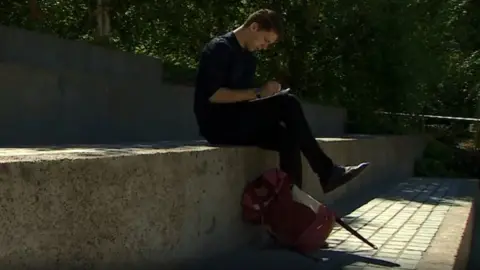Fewer young people out of work
 BBC
BBCAt 23, Kyle Scott already has a long CV. He left school at 17, and he's worked full or part time for most of his adult life.
It's not been an easy road. But Kyle's put himself through college, and he's well on his way to earning a degree at university.
Education has offered a pathway towards a career. His future is bright, even if he's had more than his fair share of dark and challenging moments in recent years. So how does he compare with others?
The UK workforce now stands at more than thirty two million people.
That's the highest employment rate on record. More than three quarters of Scots are in some sort of job. Scotland's unemployment rate stands at little more than 4 percent. So the jobs market seems robust.
And even youth unemployment - which has remained stubbornly high for decades has seen a dramatic fall in recent years.
In the past four years, the number of 18-24 year olds in Scotland has fallen from around 52,000 in the year April 2014 - March 2015 (that's 14.5% of the age-group) - to just 23,000 in Apr 2017 - March 2018 (Just 7% of the age-group).
It's a big fall.
Why?
It seems the number of young people in a job has barely changed. For the same years as I mentioned, (April-March 2014-18), the total number of 16-24s in work was:
- 333,000
- 339,000
- 340,000
- 340,000
So that suggests more are ending up in training and education.
Young men seem to be getting into work in higher numbers than young women. Which points to more of those women choosing continued training and education.
For years, youth unemployment has been seen as a stain on society. So much potential wasted. So many dreams left to wither. Now fewer young Scots are being lost before their lives really begin.
That said, 7% of 18-24 year olds are still NEETs - they're neither in education, employment or training.
For them, low-paid, insecure work is the rule, not the exception. Life is not easy if you earn less than £8 an hour.
And huge challenges remain for society, if they're to be helped onto the right path.
